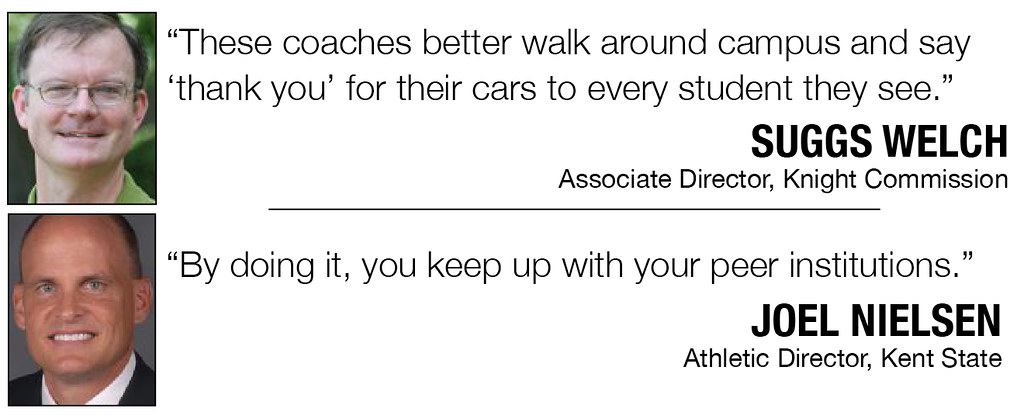The NCAA Imbalance
As universities struggle financially, schools across the Mid-American Conference are providing courtesy vehicles and vehicle stipend to athletic department employees.
At the 13 MAC schools surveyed (Western Michigan and Temple would not comment),a total of 197 courtesy cars were given to employees in athletics.
At Kent State University, the athletic director, along with the department’s head coaches and all assistants for football and basketball receive courtesy vehicles. In all, the department has 33 cars for athletic department employees.
According to David Ridspath, assistant professor in the department of Sports Administration at Ohio University, coaches that are receiving the perk over educators at universities are sending the system out of balance.
“When you’re giving a lot of more money and a lot of these coaches are very, very well paid, and you’re also getting a car on top of that, things are out of balance,” Ridspath said. “If you have such a good salary, shouldn’t you be able to afford your own car.”
At Kent State, each person receiving a courtesy vehicle must pay $150 per month and must pay for insurance on their own. According to the school’s Director of Athletics, Joel Nielsen, the school must offer the perk to compete in the conference.
“I think we being in the MAC, we’ve got a good sense on how to spend money, how much money we need, how to fundraise and how to be responsible to the institution…I would challenge most people to say there is frivolous spending.”
Central Michigan University goes beyond offering the perk to its employees.
The school’s car policy titled: “Chippewa Car Club Policy”(insert link to policy), stresses to employees how important the relationship between the school and the dealership providing the cars is. According to the policy, “the most important thing you can do is develop a positive relationship with your dealer.”
The document goes as far as to offer suggestions for coaches to keep positive relationships with their car dealer. These range from arranging a personal visit to inviting them to a round of golf. The university even offers a sample contact calendar for employees to use as a reference for maintaining such relationships.
Central Michigan’s athletic department provides its coaches and administrators 38 cars. Only one other department at the college provides cars to its employees-the College of Medicine, which has one shared car for the entire department.
According to Welch Suggs, a sports writer and Associate Director for the Knight Commission on Intercollegiate Athletics, the amount of money dedicated to vehicles for athletic departments is creating a major imbalance between education and athletics.
“In small schools, it’s not right that athletic departments are using money subsidized from students to pay for these things that they give to coaches for free,” Suggs said. “These coaches better walk around campus and say thank you for their cars to every student they see.”
At Ohio University, five employees receive courtesy vehicles and 28 receiving monthly stipends. These stipends or allowance range from $250-$480 per month.
According to Tom Symonds, Assistant Director of Media Relations at Ohio University, the perk is critical to the success of the department.
“One of the biggest reasons we give coaches cars is so that they can do their jobs,” Symonds said. “It is significantly cheaper for coaches to own or lease a car rather than pay mileage for recruiting visits. It is also an industry standard.”
As a college education becomes more expensive and college students are crippled by debt, critics such as Ridpath continue to question why athletic department employees receive such lavish treatment. Ridpath believes that the system is corrupted because as the annual salaries of coaches and athletic department employees rise, the perks that go along with the job increase as well.
“We have to work with restricting a college athletic salary because right now it’s just so far out of control—especially when the rest of campuses are suffering economically.”



